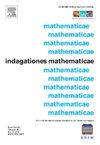Class numbers, Ono invariants and some interesting primes
IF 0.8
4区 数学
Q3 MATHEMATICS
引用次数: 0
Abstract
Our aim is to find all the prime numbers such that has at most two different prime factors, for all the odd integers such that . We solve entirely the cases , using the knowledge of the quadratic imaginary number fields with class numbers 4, 1 and 2 respectively. The case is not completely solved. Taking into account a result of Stéphane Louboutin, we prove that there is at most one value besides our list. Assuming a Restricted Riemann Hypothesis, the list is complete. In the last section of the paper we give a short sketch for the general problem: find all odd integers such that has at most two different prime factors, for all the odd integers such that .
类数、小野不变式和一些有趣的素数
我们的目标是找出所有质数,使得它们最多有两个不同的质因数,对于所有奇整数,使得 。我们利用类数分别为 4、1 和 2 的二次虚数域的知识,完全解决了 、 、 的情况。这种情况并没有完全解决。考虑到斯特凡-鲁布托(Stéphane Louboutin)的一个结果,我们证明除了我们的列表之外,最多还有一个值。假设存在限制黎曼假说,那么这个列表就是完整的。在本文的最后一部分,我们给出了一般问题的简述:找出所有奇整数,使得它最多有两个不同的质因数,对于所有奇整数,使得 .
本文章由计算机程序翻译,如有差异,请以英文原文为准。
求助全文
约1分钟内获得全文
求助全文
来源期刊
CiteScore
1.20
自引率
16.70%
发文量
74
审稿时长
79 days
期刊介绍:
Indagationes Mathematicae is a peer-reviewed international journal for the Mathematical Sciences of the Royal Dutch Mathematical Society. The journal aims at the publication of original mathematical research papers of high quality and of interest to a large segment of the mathematics community. The journal also welcomes the submission of review papers of high quality.

 求助内容:
求助内容: 应助结果提醒方式:
应助结果提醒方式:


